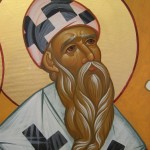Contextual Theology: Part Three
By Metropolitan Hierotheos Vlachos
 The previous example shows how contemporary theologians behave and react towards the Tradition of our Church. I have been in discussions with an Orthodox professor of biblical theology who teaches at a University abroad, but has been immensely influenced by Protestant ideas and who maintains that, since Christ is the Sun of Righteousness, the Fathers are the clouds that hide the Sun, in which case, we must remove the clouds in order to be illuminated directly by Christ.
The previous example shows how contemporary theologians behave and react towards the Tradition of our Church. I have been in discussions with an Orthodox professor of biblical theology who teaches at a University abroad, but has been immensely influenced by Protestant ideas and who maintains that, since Christ is the Sun of Righteousness, the Fathers are the clouds that hide the Sun, in which case, we must remove the clouds in order to be illuminated directly by Christ.
This point of view is anti-Orthodox.
I therefore believe it was from within this kind of perspective that the terms “neopatristic” and “postpatristic” theology were coined. At first, the term “neopatristic” timidly appeared on the scene, supposedly for the reason that Patristic texts shouldn’t merely be repeated, but rather that the “spirit” of those texts has to be traced and be conveyed into present-day circumstances – in other words, to examine how the Fathers would have addressed contemporary issues.
Despite the well-meaning intentions of some, this is a perilous move because in reality, the entirety of Patristic theology is undermined when impassioned individuals attempt to transfer the “spirit” of the Fathers into their own era. An authentic transfer presupposes people who possess the same empirical knowledge – or at least are in contact with it.
Then followed the term “postpatristic” theology, inasmuch as it was considered that we no longer need the Fathers who had lived in other times, encountered other problems, confronted other ontological and cosmological questions, had “a totally different worldview” and, consequently, who are unable to help us out in our own era.
I believe that the neopatristic and postpatristic theologies are reminiscent of a viewpoint according to which Patristic theology was of value to its own era, and that later Western scholastic theology became superior to Patristic theology, while the theology of contemporary theologians surpasses both Patristic theology and scholastic theology.
Views such as these constitute landmines in the foundations of Orthodox theology, because they are characterized by the heretical view of a progressive revelation of the Truth through the ages, and that the Church deepens in Revelation over time, as opposed to the Orthodox teaching which clearly stresses that “all truth” was once-revealed on the day of Pentecost.
Thus, there is no deepening into the Truth over time, nor is there any progressive revelation of the Truth; only that the Church formulates that same, “once-revealed” Truth according to the problems of the time.
The appearance of so-called neopatristic and postpatristic theology is attributed to certain theologians who had worked in the Western sphere, with Paris as the centre. They had embarked in dialogues with Western thought and had tried to give answers to the problems that they had encountered.
We owe much to those theologians, for example Vladimir Lossky, who had written theological works using the Fathers of the Church, and in fact the ones known as Neptic Fathers. Among those theologians however, there are some who had expressed neopatristic, postpatristic and contextual theology. We shall make a brief mention of some of those ideas.
They mention an ecumenism which “should abandon verbal arguments in order to be founded upon an experimental reality of salvation: by re-submerging those systems and ideas (which in the long run are nothing more than traces within the spherical experience of the Church) into the best that Her experience possesses”.
Fanaticism is linked to
“confessional identity”,
which
“constitutes, if not its seed, then at least the ground in which it is cultivated”,
and that is why there is word of reconstructing a house
“with open doors, the New Jerusalem, the Kingdom”,
in which everyone will have a place. And whosoever does not wish to toil for the construction of such a house should be removed, while the “key” to that house is the best thing that one could possess, and that which unites us.
Also being traced are common, “contextual” points between Christianity and Judaism, Islam, Hinduism and Buddhism. From within this perspective, “a new cultural mutation” must be attempted, and also (as stressed),
“we Christians need to work hard on the prospect of this convergence. This is far more interesting, compared to arguing amongst ourselves.”
“Postpatristic” and “contextual” ideas such as these are transferred into Greece in “middleman” style and are intended to either contradict the Fathers (who are regarded as “museums” of the past), or to misinterpret Patristic passages in order to incorporate them in the new mentality.
The purpose and the perspective of postpatristic and contextual theology is evident in just how dangerous it is for the Orthodox Church, leading Her into a syncretism – not only in the way of life but also in the expression of the faith. This in reality gives rise to doubt about the demarcation of the faith as done by the holy Fathers; in other words, it dismantles the entire theology of the Ecumenical Councils. This is a serious problem which needs to be tackled ecclesiastically.
Part Four will be published tomorrow.
